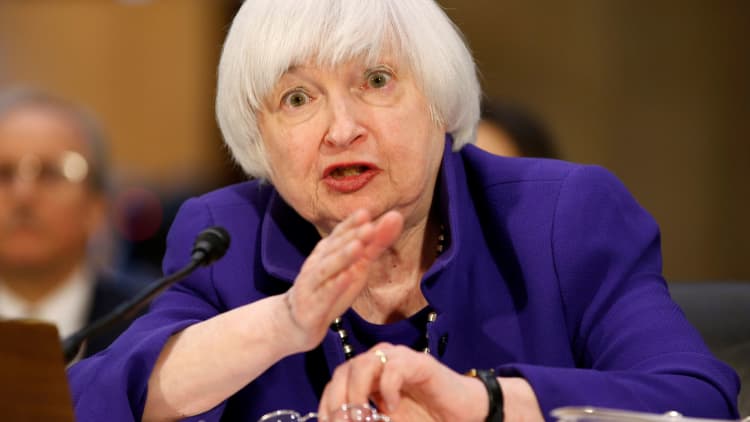
Slower January wage growth is a big reason Wall Street believes the Federal Reserve will not feel pressed to raise interest rates next month. Bankers who want a deeper explanation may look no further than their own paychecks.
In January, the financial services sector showed a steep year-over-year decline in average hourly wages, even as it added 32,000 employees, and economist Diane Swonk says the difference-maker there was a drop in annual bonuses for 2016.
"Financial services was a driving factor of employment gains, and here's one of the areas where employment gains came in, and we lost 34 cents an hour. That's stunning," said Swonk, CEO of DS Economics. Swonk's firm dug into why the overall average hourly wages were up only 0.1 percent in January and found from the Bureau of Labor Statistics that a lack of bonuses was a big factor in the wage decline.
"Bonuses were down for a third year in a row," she said. "Those bonuses were tied to incentive pay as well."
While the BLS had no specifics, Swonk said it is a good explanation for why the financial services sector stands out — and it's a number that should return to its prior pace over the next couple of months.
The January employment report was strong overall, with nonfarm payrolls growing by 227,000, but wages the one disappointment.
Wage growth is a precursor to inflation, and the Fed may feel that inflation is rising faster if wages also grew, along with consumer prices. Rising average hourly earnings in January were up just 3 cents, after a 6-cent rise in December. That translates to a year-over-year gain of 2.5 percent in January, after a 2.8 percent jump in December and gains of 2.7 percent in the several months before that.
The financial sector was one of the two main industries to show a decline in the government's January employment report. The information sector showed a one-cent decline, while other swere stronger. Construction was up 41 cents over December.
'January is a fluke'
Bond yields declined in response to the January report, and has since been surprised by some hawkish comments from Fed Chair Janet Yellen and others. But odds are still against a March rate hike, with most economists seeing June as more likely.
"The bottom line is that January is a fluke in our comparisons. Our numbers suggest we can snap back over the next several months. By mid-year, you'll have more normal wage gains again," said Swonk. Wage growth was also weaker when compared with a strong half percent gain in January of 2016.
"We actually think by the end of the year, they'll be up 3.6 percent (year-over-year)," said Swonk. "You can easily get to 3 percent mathematically by slowly growing wages at their slowest pace last year."
She said the Fed has argued 3 percent sustained wage growth is needed in order to get to 2 percent inflation. While the consumer price index in January rose 2.5 percent over last year, the most in four years, the Fed's preferred PCE deflator is running at 1.7 percent.
Hedge fund pay takes a hit — unsurprisingly
Compensation changes at hedge funds, the hefty withdraws in the mutual fund business and the lack of activity in investment banking could explain a big drop in bonus pay for 2016, which would have shown up as cash payments in January, according to Dick Bove, vice president equity research, Rafferty Capital.
"If you think of the amount of funds flowing out of mutual funds, it's been in the hundreds of billions. That's one main source of revenue for the industry," he said. "The commission income to hedge funds — the 2 and 20 deals are not in existence in the hedge fund to the degree they were previously." Two and 20 refers to a standard fee arrangement where hedge fund clients pay the fund 2 percent of their assets and 20 percent of any profits. "Those deals are going out the window," he added.
While Wall Street's banks and firms paid bonuses, Bove said they were still lower.
"You have huge pressures for commission income to Wall Street firms. One, the customers are really hurting and two, the market took off at the end of the year but the volumes were relatively low. If you take a look at investment banking, the big blockbuster deals that took place in 2105 were not there in 2016," he said.
He said 2017 looks to be better, but it's yet to be seen.
Watch: Fed policy can be offset to Trump's econ plan



